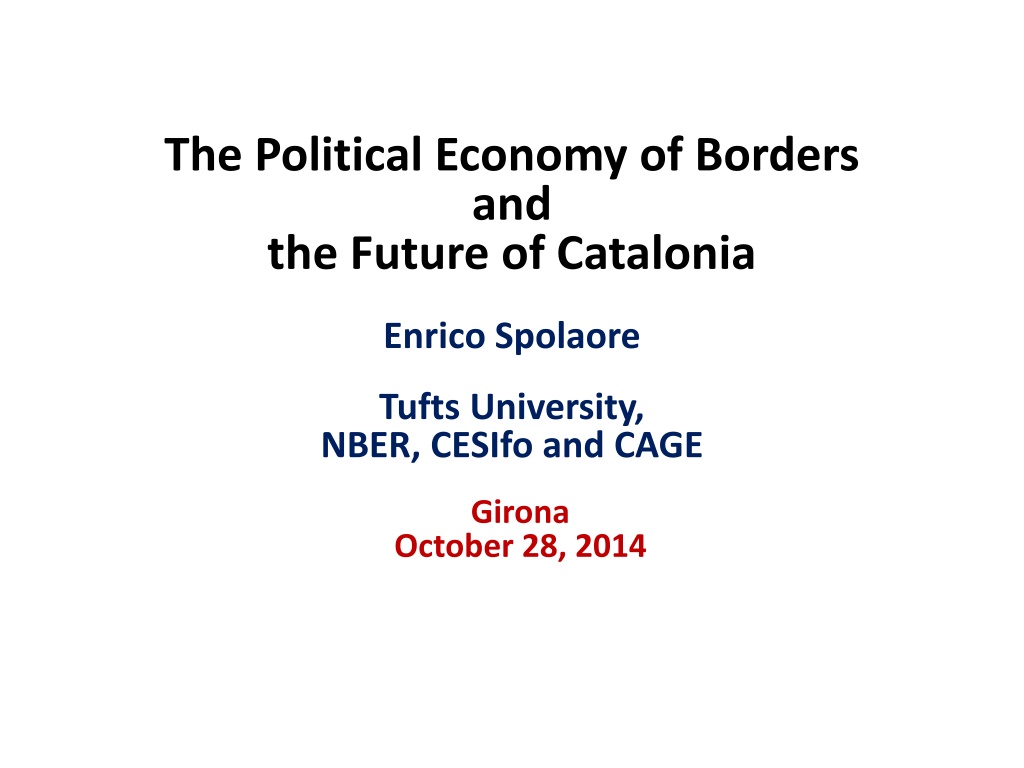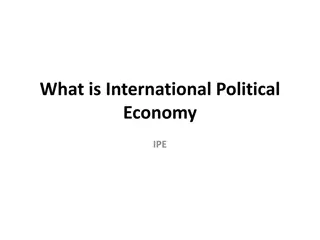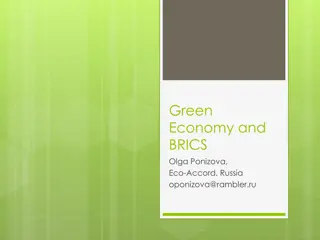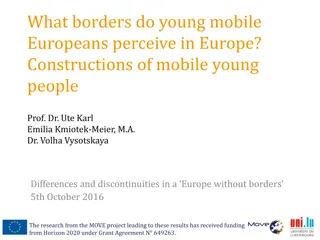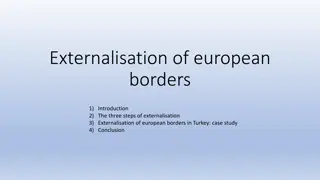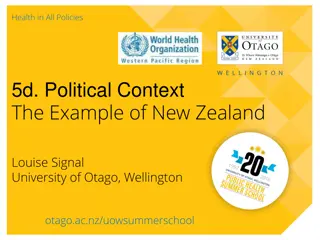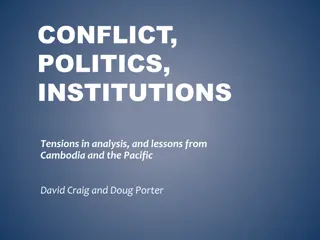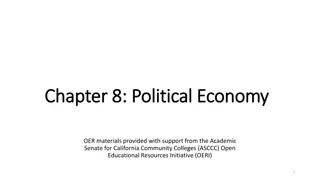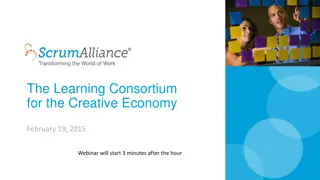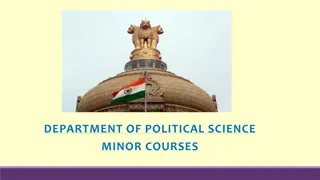The Political Economy of Borders and the Future of Catalonia
Explore the political dynamics behind the formation and breakup of sovereign states, focusing on Catalonia's independence aspirations amidst the backdrop of increasing global statehood. Key thinkers like Aristotle, Montesquieu, and Beccaria offer insights on the challenges and benefits of nation size and governance structures.
Download Presentation

Please find below an Image/Link to download the presentation.
The content on the website is provided AS IS for your information and personal use only. It may not be sold, licensed, or shared on other websites without obtaining consent from the author. Download presentation by click this link. If you encounter any issues during the download, it is possible that the publisher has removed the file from their server.
E N D
Presentation Transcript
The Political Economy of Borders and the Future of Catalonia Enrico Spolaore Tufts University, NBER, CESIfo and CAGE Girona October 28, 2014
Motivation The formation and breakup of sovereign states has been at the center of history for thousands of years In recent decades, a dramatic increase in the number of independent states and the spreading of demand for autonomy and independence have renewed interest in the redrawing of national borders. The referendum on Scotland s independence on Sept. 18, 2014 was a close call: 55% voted against and 45% in favor. The political debate on Catalonia s independence is at a critical juncture.
Number of sovereign states has increased dramatically in recent decades In 1945 there were 74 independent countries (of which 51 were UN members) Today the United Nations has 193 members (latest addition: South Sudan in 2011). More than thirty new member states have joined the UN over the last thirty years. About half of the UN member countries have less inhabitants than Catalonia (7.5 million). The smallest UN member, Tuvalu, has less than 12,000 inhabitants.
For centuries, number and size of nations debated by philosophers and political thinkers Aristotle: experience has shown that it is difficult, if not impossible, for a populous state to be run by good laws Montesquieu: in a large republic, the common good is sacrificed to a thousand considerations and is subordinated to exceptions; it is vulnerable to whims and accidents. In a small republic, the public good is more strongly felt, better known, and closer to each citizen. David Hume: Nothing is more favorable to the rise of politeness and learning than a number of neighboring and independent states, connected together by commerce and policy.
An Italian (Cesare Beccaria) in the 18thcentury: "To the extent that society increases, each member becomes a smaller part of the whole, and the republican sentiment becomes proportionally smaller, if the laws do not take care to reinforce it. Societies, like human bodies, have their circumscribed limits, and if they grow beyond them, their economy is necessarily disturbed. [...]. A republic that is too vast cannot save itself from despotism except by subdividing itself and uniting itself into so many federative republics."
More recently, size of nations and endogenous borders addressed by political economists Traditionally, economists have studied the economic implications of national borders (international economics), but have taken borders themselves as given (exogenous). A more recent economic literature has focused on the endogenous formation and breakup of national states and political unions. The literature on endogenous national borders studies the interactions of economic and non-economic (political, ethnic, cultural) variables in the formation and breakup of national states, using the theoretical and empirical tools of economic analysis It is part of a broader trend towards studying the deeper historical and cultural determinants of economic and political outcomes and institutions
Goals of this lecture Review some key concepts and results on the political economy of national borders Discuss the implications of the analysis for Catalonia
Main References The Economics of Political Borders prepared for the Handbook on the Economics of Public International Law, Edward Edgar Publishing (Research Handbooks in Law and Economics series), forthcoming What is European Integration Really About? A Political Guide for Economists published in the Journal of Economic Perspectives, Summer 2013
Rest of this talk The Key Trade-off: Economies of scale vs. heterogeneity costs Costs and benefits of heterogeneity The political economy of heterogeneous populations: democratization, voting over borders, and optimal transfers The other side of the trade-off: economies of scale defense and security economic integration The role of international openness Implications for Catalonia
A Key Trade-off Public goods (legal systems, defense and security, common currency) come with economies of scale (benefits from a larger size) but those benefits must be traded against the costs of heterogeneity (different preferences for public policies in larger, more diverse populations)
Costs and Benefits of Heterogeneity Key Distinction: Public Goods vs. Rival Goods - Heterogeneous preferences and traits negatively affect the provision of public goods - which are non-rival in consumption and must be shared by all within a jurisdiction whether one likes them or not - In contrast, diversity across individuals and groups comes with benefits when considering interactions about rival goods
Important Implications for the Relation between Heterogeneity and Conflict Conflict over public goods is higher among individuals and groups which are more different from each other (higher heterogeneity associated with more conflict) Conflict over rival goods is higher among individuals and groups that are more similar to each other
Empirical Evidence 1) Conflict within borders associated with more heterogeneity More heterogeneous societies more likely to engage in civil and ethnic conflict (intrastate conflict), which tends to be over control of public goods (government) - Montalvo and Reynal-Queirol (2005) and Esteban, Joan, Mayoral and Ray (2012): ethnolinguistic polarization and ethnic conflict - Desmet, Ortu o-Ort n and Wacziarg (2012): linguistic cleavages and civil conflict Arbatli, Ashraf and Galor (2013): genetic diversity and civil conflict
Empirical Evidence 2) Conflict across borders is higher among more similar societies International conflict more likely among states with populations that are more closely related (at a smaller genetic, linguistic, and religious distance), even after controlling for numerous measures of geographic distance and other factors that affect conflict, including trade and democracy (Spolaore and Wacziarg, War and Relatedness, 2012) Interpretation: interstate conflict mostly over rival and excludable goods (such as territory and resources), and hence more likely among states with populations that share more similar preferences, and inherit such preferences with variation from their ancestors.
Open questions How do deeper historical and cultural variables affect current preferences over public goods, policies, and institutions? How does heterogeneity of culture and preferences respond endogenously to changes in institutions and policies? These questions are part of a large and growing literature on culture and economics
The Political Economy of Heterogeneous Populations and National Borders In general, in political economy what matters is not just aggregate costs and benefits, but their distribution heterogeneity costs are no exception Heterogeneity of preferences has a stronger effect on the number and size of nations when voters directly decide national policies and borders (effects of democratization)
Leviathans and Borders Rent-maximizing governments (Leviathans) who can ignore heterogeneous preferences of some or most of their subjects and let peripheral populations bear most of the heterogeneity costs - tend to form larger, more centralized states. Leviathans concerned about centripetal effects of heterogeneity costs may have an incentive to reduce heterogeneity with policies of cultural and linguistic homogenization, nation-building, etc. (Alesina and Spolaore, 2003, chapter 5 Alesina and Reich, 2013).
Voting Over Borders Voters far from the central government in preferences/culture/identity bear the largest share of heterogeneity costs and, if allowed to vote, will break up an inefficiently large country (Alesina and Spolaore, ch. 3) Voters may even break up an efficient country in the absence of optimal tax and transfers schemes, which can be unfeasible and/or politically non credible (Alesina and Spolaore, ch. 4; Spolaore, 2011).
Optimal Taxes and Transfers to Keep Countries Together? Ideally, in order to keep a heterogeneous country together, optimal taxes and transfers should be preference-based: regions which are politically and culturally farther from the center should pay lower taxes (for given income) and/or obtain higher transfers In reality, most tax-and-transfer schemes are income-based, and increase the likelihood of a breakup when the regions at the periphery (such as Catalonia) are richer than average.
The other side of the trade-off: Benefits of scale Provision of public goods with large economies of scale - in particular: defense and security Extent of the domestic market
Role of the International Economic and Political Environment The benefits of a large size depend on the international economic and political environment: -)They are higher in a world of higher trade barriers, higher international conflict, and weak military alliances -) They are lower in a world of lower trade barriers (high economic integration), peaceful international relations, and strong military alliances
Economic Integration and Political Integration substitutes or complements? The functionalist theory of integration is that economic integration across independent countries should lead to political integration among them (for a discussion: Spolaore, 2013) However, the example of the German customs union (Zollverein) often mentioned in this respect is misleading, because the main force behind commercial integration was political integration pushed by Prussia s military power (Gilpin, 2001). International cooperation among independent countries and political integration (formation of a political union) can be viewed as substitute ways to lower barriers to trade. If two regions can already agree to reduce their trade barriers with each other while remaining independent, they are going to obtain smaller additional gains from trade if they also form a political union with a unified domestic market.
Size of Nations, International Openness, and Economic Performance In an economically integrated world, countries can be small and rich: of the six richest countries in the world (in terms of GDP per capita, PPP-adjusted, World Bank), the largest is Singapore, with 5.5 million inhabitants (smaller than Catalonia), and the second largest is Norway, with 5 million people. And being large is no guarantee of a very high income. Of the six largest countries in the world, the second richest in terms of GDP per capita, after the United States, is Brazil (a middle-income country).
Empirical evidence For closed countries size matters a lot For open countries size does not matter For small countries, openness matters a lot For large countries, openness matters much less.
Conditional correlations Correlation between Size and Economic Growth for closer countries: for open countries: Correlation between Openness and Economic Growth for smaller countries: for larger countries 0.587 large -0.089 negative 0.579 large 0.131 small
Economic integration and political disintegration are mutually reinforcing As international economic integration increases, the economic costs of being small are reduced, and hence political disintegration becomes less expensive In a world of smaller countries, international openness is more important Economic integration and political disintegration go hand in hand (Alesina and Spolaore, 1997, 2003; Alesina, Spolaore and Wacziarg, 2000, 2005; Spolaore and Wacziarg, 2006)
Figure 4. Scatterplot of the Detrended Number of Countries Plotted Against the Detrended Trade to GDP ratio (With Sub-Saharan Africa - 1903 1992) 19041905 23 1906 1907 1908 1909 1992 1910 1911 1912 1982 1913 1981 1980 1983 1914 1984 1985 1919 1979 1976 1977 1986 1988 1915 1987 1920 1978 Detrended # of Countries 1921 1922 1972 1916 1975 1923 1918 1989 1917 1973 1974 1924 1969 1971 1967 1968 1990 1925 1970 1991 1926 1927 1966 1928 1929 1965 1930 19631964 1931 1932 1933 1934 1935 1962 1961 1936 1937 1938 1950 1939 1951 1940 1952 1949 1953 1942 1948 19541955 1958 1959 1941 1943 1947 1957 1956 1960 1944 1946 1945 -26 -23.08 18.84 Detrended Trade to GDP ratio
Implications for Catalonia Economic Benefits and Costs from Independence Political Economy of Secession: Voting over borders? Alternative: credible preference-based tax-and-transfer system? Role of International Organizations (EU, WTO, NATO)
Key Questions Relation with Rest of Spain after Independence Relation with Rest of Europe Relation with Rest of the World
Economic Consequences of a Peaceful and Democratic Breakup Low barriers to trade and factor mobility with rest of Spain after a peaceful breakup. Current estimates of border effect on trade, based on historical experiences of long- existing borders (e.g., US/Canada or UK/Ireland) tend to overestimate costs. In reality, negative effects of breakup of existing countries such as UK or Spain on established trade patterns among their regions are likely to be significantly smaller.
Defense and Security Low benefits from current union in terms of defense and security, both from Spain s and Catalonia s perspective, given the current geopolitical situation, and hence small costs from breakup. Important precondition: ability for an independent Catalonia to engage in military alliances (e.g., NATO), and to join international organizations.
The Role of International Organizations and the EU In general, international organizations should welcome new member states if they result from the peaceful and democratic breakup of existing members. Existing members should not have veto power. This principle is especially important for the European Union. This issue was at the center of the debate about Scotland s referendum, and plays a paramount role when considering Catalonia s future.
Catalonia, Europe, and the World Currently, very low trade barriers with the rest of Europe and relatively low barriers with the rest of the world. This situation unlikely to change in case of peaceful breakup, provided that Catalonia is able to participate in international organizations and agreements (WTO, EU). If anything, an independent Catalonia s international openness likely to increase in the long run: Catalonia s smaller size and political and cultural attitudes towards European integration likely to be associated with stronger incentives to integrate.
Voting over Independence: Scotland vs. Catalonia Key difference between Scotland and Catalonia: Scotland s income per capita close to UK average, Scotland net recipient of income-based transfers. Historical differences in the formation of the current institutional status quo: Scotland joined the UK in 1707 with an Act of Parliament, Catalonia lost its institutional autonomy at the end of the Spanish war of Succession in 1714. In sum, Rest of Spain has more to lose from Catalonia s breakup than UK from Scotland s breakup, while the institutional history of Spain is less conducive to democratic decisions over borders.
In Conclusion Borders which are not supported by their populations are not stable in the long run in a democratic setting where heterogeneity of preferences cannot be ignored or suppressed by force. Two possible outcomes in a situation such as that of Catalonia: Voting over borders Drastic renegotiation of taxes and transfers towards a preference-based system
